Crispy Coconut Shrimp Delightful and Easy Recipe
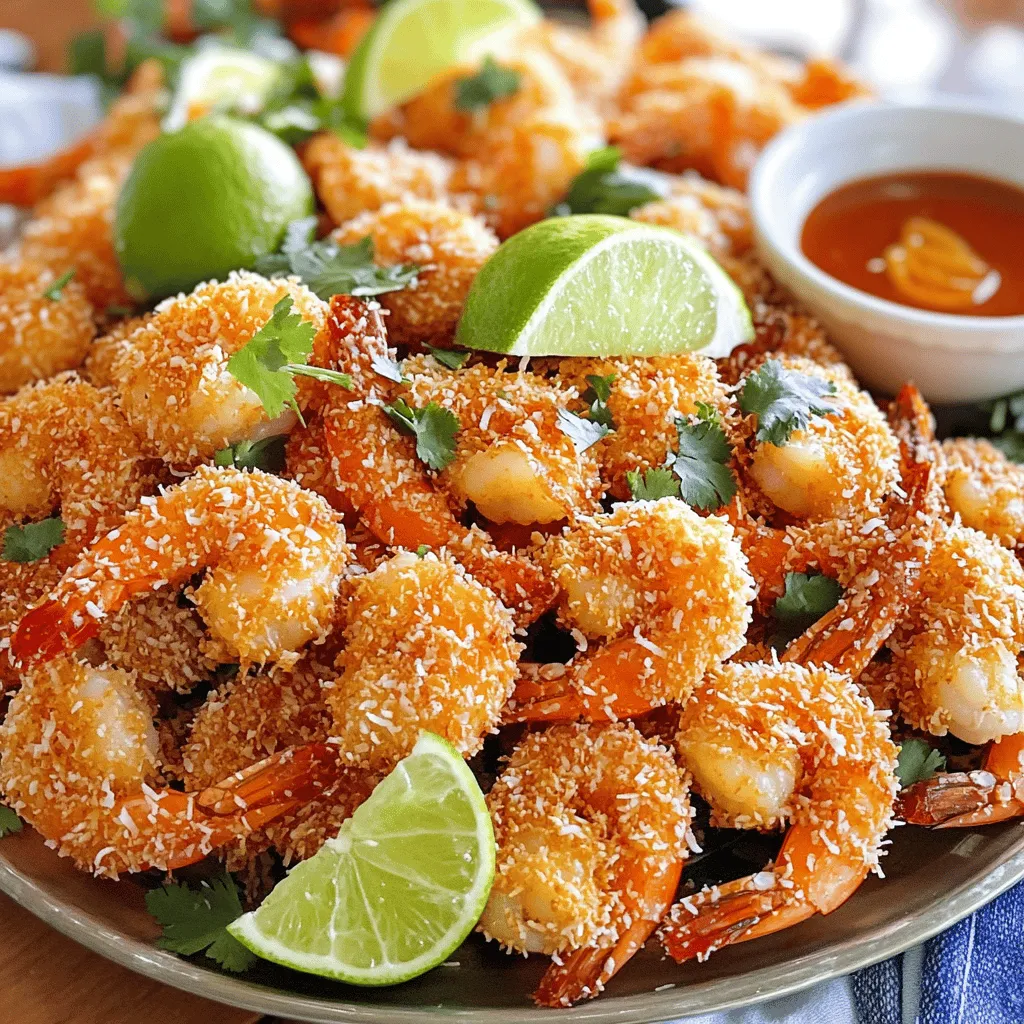
Are you ready to elevate your dinner game with a delightful twist? My Crispy Coconut Shrimp recipe is simple, fun, and packed with flavor. You’ll enjoy the crunch of Panko breadcrumbs and sweet coconut with every bite. We’ll go through all the ingredients, easy steps, and tips to make your shrimp cooking experience a breeze. Join me as we whip up this delicious dish together!
Ingredients
List of Required Ingredients
– 1 pound large shrimp, peeled and deveined
– 1 cup all-purpose flour
– 2 large eggs, beaten
– 1 cup shredded coconut (preferably sweetened)
– 1 cup Panko breadcrumbs
– 1 teaspoon garlic powder
– 1 teaspoon paprika
– Salt and black pepper to taste
– Oil for frying (such as vegetable or canola oil)
Ingredient Substitutions
You can swap shrimp for chicken or tofu for a different taste. If you need a gluten-free option, use almond flour instead of all-purpose flour. For breadcrumbs, try gluten-free Panko. You can also choose unsweetened coconut if you want less sweetness.
Importance of Fresh Ingredients
Fresh shrimp makes a big difference in flavor. Look for shrimp that smells clean and ocean-like. When choosing coconut, make sure it is fresh and free from any off smells. High-quality breadcrumbs also add to the crunch. The better the ingredients, the tastier your crispy coconut shrimp will be.
Step-by-Step Instructions
Preparing Your Breading Station
To start, you need three shallow dishes. This setup helps you coat the shrimp easily. In the first dish, add the all-purpose flour. This layer gives the shrimp a base. In the second dish, beat the two large eggs well. This mixture will help the breading stick. In the third dish, combine the shredded coconut, Panko breadcrumbs, garlic powder, paprika, salt, and black pepper. Mix it all together so the flavors blend well.
Drying and Coating the Shrimp
Next, you must dry the shrimp. Use paper towels to pat the shrimp dry. This step is key for a crispy coating. Now, let’s coat the shrimp. First, take a shrimp and dredge it in the flour. Shake off any extra flour. Then, dip the floured shrimp into the beaten eggs. Let any excess egg drip back into the dish. Finally, press the shrimp into the coconut-Panko mix. Make sure each shrimp is well-coated by pressing gently.
Frying and Serving the Shrimp
Now, it’s time to fry! In a large skillet, pour enough oil to cover the bottom by about one inch. Heat the oil over medium-high heat. Look for the oil to shimmer, which means it’s ready. This is around 350°F (175°C). Carefully add the coated shrimp in batches. Do not overcrowd the pan. Fry for about 2-3 minutes on each side. You want them to turn golden brown and crispy. Once done, use a slotted spoon to move the shrimp to a plate lined with paper towels. This drains excess oil. Let them cool slightly before serving. To make it special, serve on a large platter with sweet chili sauce and lime wedges. Enjoy your crispy coconut shrimp!
Tips & Tricks
Achieving Extra Crispiness
To make your crispy coconut shrimp perfect, pat the shrimp dry with paper towels. This removes extra moisture, helping the coating stick well. If the shrimp are wet, they won’t crisp up right.
Next, heat your oil to the right temperature. Aim for about 350°F (175°C). This hot oil cooks the shrimp fast, leading to a great crunch. Use a thermometer to check, or drop in a small piece of batter. If it sizzles, you are ready to fry.
Preventing Shrimp from Sticking
Choosing the right oil is key. Use oils like vegetable or canola. These oils have high smoke points. They help your shrimp fry evenly and keep them from sticking.
When frying, avoid crowding the pan. Fry in small batches. If you add too many shrimp at once, the oil cools down. This can lead to soggy shrimp instead of crispy ones.
Serving Suggestions
Pair your crispy coconut shrimp with tasty dips. Sweet chili sauce is a favorite. It adds a nice flavor contrast. You can also try a tangy mango salsa for a fruity twist.
For a beautiful presentation, arrange the shrimp on a large platter. Add fresh lime wedges and sprigs of cilantro around the shrimp. These not only look nice but also add refreshing flavors.
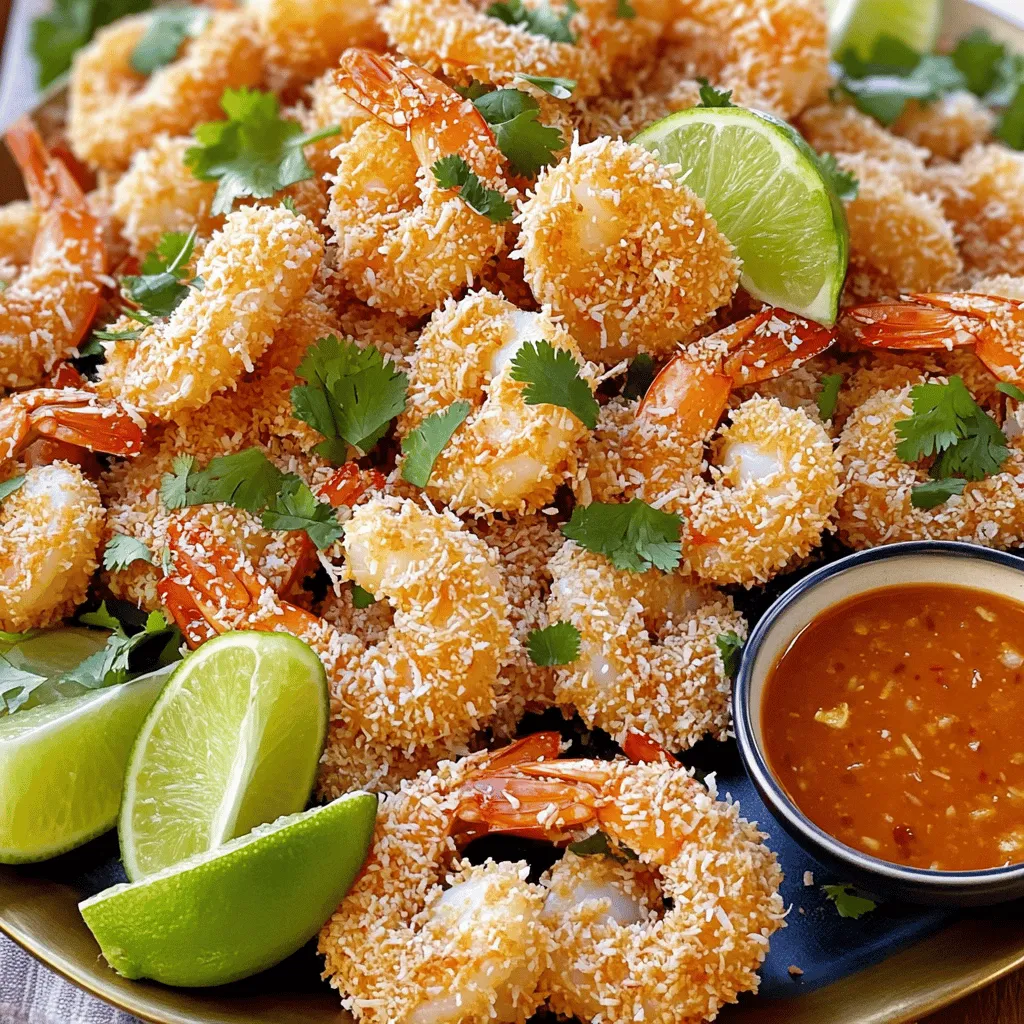
Variations
Spicy Coconut Shrimp
To make spicy coconut shrimp, add heat with spices. You can use cayenne pepper or chili powder. Start with a small amount, then taste as you go. This way, you can control the spice level. For dipping sauces, try sweet chili sauce or a spicy mango salsa. Both pair well with the shrimp’s flavor.
Oven-Baked Coconut Shrimp
If you want a healthier option, bake the shrimp instead of frying. To do this, preheat your oven to 400°F (200°C). Instead of oil, use a cooking spray on your baking sheet. Place the shrimp in a single layer. Bake for about 15-20 minutes. Flip them halfway for even cooking. They won’t be as crispy as fried, but still delicious!
Coconut Shrimp with Different Flavors
You can add new flavors to your coconut shrimp. Try mixing in citrus zest, like lime or lemon, into your breading. Fresh herbs, such as cilantro or parsley, also work well. You can also experiment with different breading types. Use crushed tortilla chips or even ground nuts for a fun twist. Each variation offers a unique taste experience!
Storage Info
Storing Leftover Coconut Shrimp
To keep your coconut shrimp fresh, store them right. First, let them cool down to room temperature. Then, place them in an airtight container. This will help keep them crispy. You can also use a zip-top bag. Just make sure to squeeze out all the air. Store them in the fridge if you plan to eat them in the next few days.
Reheating Tips
When reheating coconut shrimp, you want them crispy again. The best method is to use an oven. Preheat it to 350°F (175°C). Place the shrimp on a baking sheet lined with parchment paper. Bake them for about 10-12 minutes. Check them often to avoid overcooking. You can also use an air fryer. Set it to 350°F and cook for about 5-7 minutes. This way, they stay crunchy and delicious.
Freezing Coconut Shrimp
You can freeze both raw and cooked coconut shrimp. For raw shrimp, follow these steps. First, coat the shrimp as you normally would. Then, spread them on a baking sheet. Freeze them for about 1-2 hours. Once they are solid, transfer them to a zip-top bag. For cooked shrimp, let them cool down first. Then, follow the same freezing steps. To thaw, place them in the fridge overnight. You can also use cold water for a quicker method. Just seal them in a bag and submerge in water for about 30 minutes.
FAQs
Can I use frozen shrimp?
Yes, you can use frozen shrimp. Thaw them safely before cooking. Place frozen shrimp in the fridge overnight. If you’re short on time, put them in a bowl of cold water for about 30 minutes. After thawing, pat them dry with paper towels. This helps the coating stick better. Using fresh shrimp is great, but frozen works well too.
How do I know when the shrimp is cooked?
You can tell shrimp is cooked when it turns pink and opaque. They should also curl slightly. Cooking shrimp takes about 2-3 minutes on each side. If you see them turning golden brown, that’s a good sign. Using a meat thermometer, shrimp should reach 120°F. Overcooking makes shrimp tough, so watch carefully.
What are the best dipping sauces for crispy coconut shrimp?
Many sauces pair well with crispy coconut shrimp. Here are some favorites:
– Sweet chili sauce
– Mango salsa
– Spicy aioli
– Pineapple dipping sauce
– Classic cocktail sauce
Feel free to try any of these options. You can even mix and match for fun flavor combos.
In this blog post, we covered how to prepare crispy coconut shrimp using simple ingredients and steps. You learned about ingredient choices, frying techniques, and storage tips to keep your shrimp fresh. Always use good, fresh ingredients for the best flavor. Don’t hesitate to get creative with variations and dips. Enjoy making this delicious dish, whether for a meal or a snack. With these tips, you’ll impress everyone with your coconut shrimp. Happy cooking!
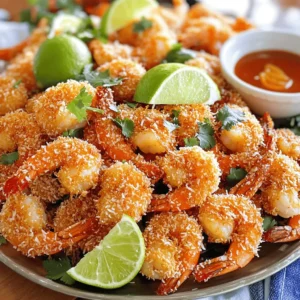

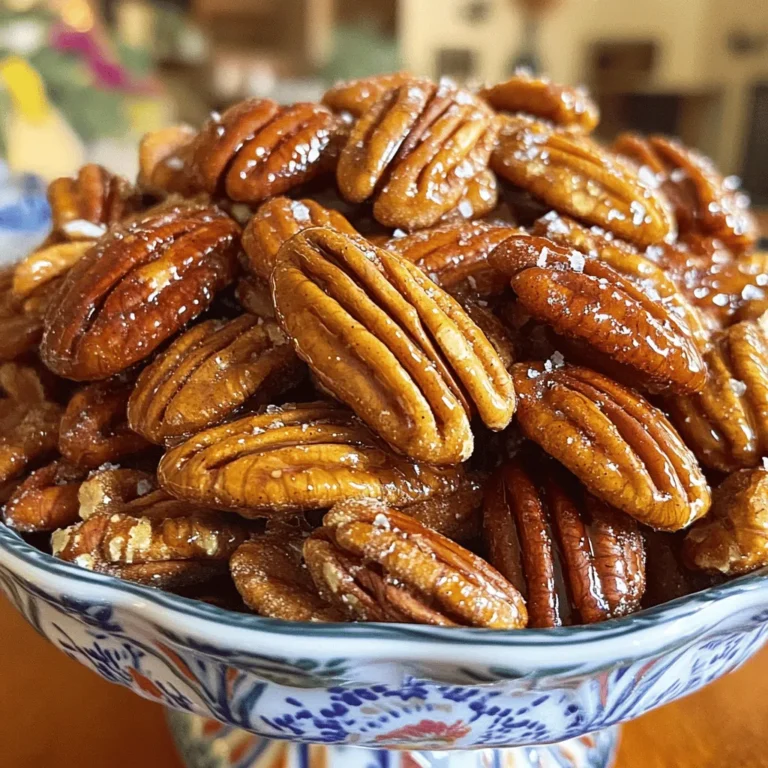

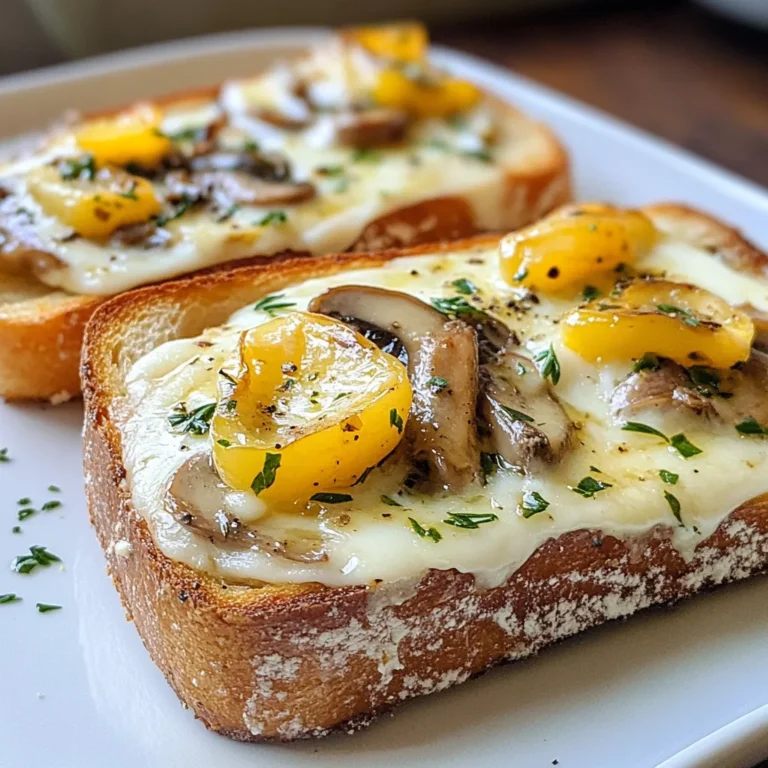
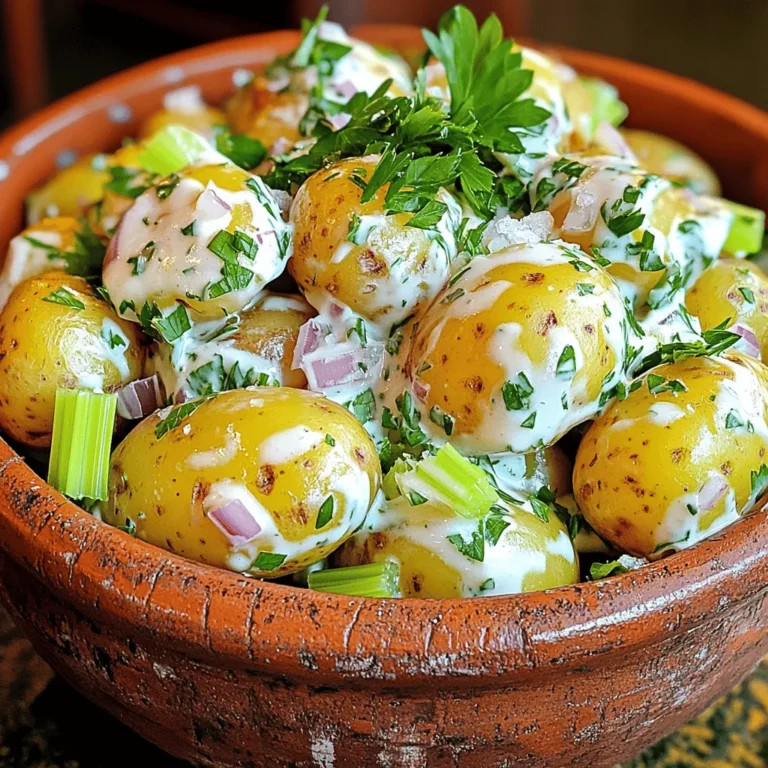
![- 1 lb (450 g) Brussels sprouts, trimmed and halved - 3 tablespoons balsamic vinegar - 2 tablespoons extra virgin olive oil - 1 tablespoon pure maple syrup - 1 teaspoon garlic powder - 1 teaspoon onion powder - Salt and freshly ground black pepper to taste - ¼ cup grated Parmesan cheese (optional) - 2 tablespoons chopped walnuts (for an added crunch) To make the best Balsamic Roasted Brussels Sprouts, these ingredients are key. First, Brussels sprouts are our main star. They need to be fresh and free of any brown spots. Halving them helps them roast evenly. Balsamic vinegar adds a sweet and tangy flavor. It pairs well with the sprouts and gives them a nice glaze. Extra virgin olive oil helps the sprouts crisp up in the oven. The maple syrup adds a touch of sweetness, balancing the vinegar's acidity. For seasonings, garlic powder and onion powder bring depth. Salt and black pepper are vital for taste. If you want to make it fancy, sprinkle some grated Parmesan cheese on top. It melts beautifully and adds creaminess. Lastly, chopped walnuts add a delightful crunch and nutty flavor. You can find the full recipe in this article. Enjoy bringing these flavors together! - Preheat your oven to 400°F (200°C). - In a large bowl, mix halved Brussels sprouts with balsamic vinegar, olive oil, maple syrup, garlic powder, onion powder, salt, and pepper. Toss well to coat each sprout. - Line a baking sheet with parchment paper for easy cleanup. - Spread the Brussels sprouts in a single layer on the sheet. Roast them for 20-25 minutes. Halfway through, give them a toss for even cooking. - If you like, sprinkle Parmesan cheese over the sprouts in the last 5 minutes of roasting. - Toss in chopped walnuts right before serving for a crunchy texture. This recipe makes a tasty side dish that everyone will love. You can find the Full Recipe to follow along easily. To get the best roasted Brussels sprouts, keep them in a single layer on the baking sheet. This helps them cook evenly. If they are too crowded, they will steam instead of roast. Toss them halfway through to ensure even caramelization. This way, you'll get that nice crispy outside while keeping the inside tender. You can boost the flavor with extra spices. Consider adding a pinch of red pepper flakes for heat or some rosemary for a fragrant twist. Always use high-quality balsamic vinegar. It adds depth and sweetness that makes your sprouts shine. For a lovely look, serve your Brussels sprouts in a rustic bowl. Drizzle them with balsamic glaze for a shiny finish. Adding fresh herbs like parsley or thyme can brighten up the dish. A sprinkle of grated Parmesan cheese right before serving can also enhance both flavor and appearance. For the full recipe, click here. {{image_4}} You can easily make this dish fit your diet. To make it vegan, swap out the Parmesan cheese for a vegan cheese alternative. This choice gives you a tasty, creamy flavor without any dairy. Another great option is to use agave syrup instead of maple syrup. Agave provides a similar sweetness but is completely plant-based. Want to up the flavor? Add minced garlic or shallots to your mix. These ingredients bring richness and depth to the dish. You can also get creative by incorporating different nuts or seeds. Try using almonds, pecans, or sunflower seeds to add crunch and flavor. For a fun twist, roast Brussels sprouts with other vegetables like carrots or sweet potatoes. This medley creates a colorful and tasty side dish. If you want a heartier meal, mix in grains or legumes. Quinoa or chickpeas pair well with the Brussels sprouts, making your dish filling and nutritious. For the full recipe, check out the [Full Recipe]. After you make balsamic roasted Brussels sprouts, store them in an airtight container. This keeps them fresh and tasty. You can enjoy them for up to four days in the fridge. If you have leftovers, let them cool before sealing the container. Avoid adding any sauces until you’re ready to eat. When it's time to reheat, I recommend the oven for the best results. Preheat your oven to 350°F (175°C). Spread the sprouts on a baking sheet and heat for about 10 minutes. This helps keep them crispy. If you use a microwave, place them in a microwave-safe dish. Heat for 1 to 2 minutes but keep an eye on them. Microwaving may make them soft. You can freeze leftover Brussels sprouts if you want to save them. First, let them cool completely. Then, place them in a freezer bag. Remove as much air as you can. They can last up to three months in the freezer. When you’re ready to use them, thaw them overnight in the fridge. Reheat in the oven or stovetop for a tasty side. For the complete guide on how to make this dish, check the Full Recipe. Yes, you can make Balsamic Roasted Brussels Sprouts ahead of time. To do this, prepare the sprouts as directed in the Full Recipe but stop before roasting. Toss the halved sprouts with the marinade and store them in the fridge for up to 24 hours. When you're ready to eat, just roast them in the oven as normal. If you want to reheat leftovers, place them back in the oven at 350°F (175°C) for about 10 minutes. This keeps them crispy and tasty. Balsamic Roasted Brussels Sprouts pair well with many dishes. They make a great side for roasted chicken or pork. You can also serve them with grilled salmon for a healthy meal. If you want a vegetarian option, try them with quinoa or rice dishes. They also work well with a light salad or as part of a holiday spread. If you like some heat, there are easy ways to spice up your Brussels sprouts. You can add red pepper flakes to the marinade. Just one teaspoon gives a nice kick without overpowering the flavor. For even more heat, use a pinch of cayenne pepper. Mix this into the marinade for an extra layer of warmth. Try these tips for a spicy twist on this tasty side dish! This blog post gives you a simple guide to making Balsamic Roasted Brussels Sprouts. We covered the main ingredients, from balsamic vinegar to walnuts. You learned step-by-step how to roast them perfectly and add flavor. Tips on variations and storage help you enjoy this dish longer. These sprouts are not just tasty; they're easy to make and can impress anyone. Enjoy experimenting with flavors and serving ideas!](https://blissfulmeal.com/wp-content/uploads/2025/06/1a317fc5-64fd-4d3d-a196-53c60d74d1b4-768x768.webp)
![- 1 pound fresh asparagus, trimmed - 4 cloves garlic, finely minced - 2 tablespoons extra virgin olive oil - Zest of 1 medium lemon - 2 tablespoons freshly squeezed lemon juice - 1 teaspoon red pepper flakes (optional, for a kick) - Salt and freshly ground black pepper, to taste - ¼ cup finely grated Parmesan cheese (optional, for added richness) - Fresh parsley, chopped, for garnish When measuring ingredients, precise amounts matter. Here are some tips: - For asparagus, choose tender, bright green stalks. - Use a microplane for lemon zest to get fine shavings. - Minced garlic should be small for even flavor. - Measure olive oil with a tablespoon for accuracy. - Adjust salt and pepper based on personal taste. If you lack any ingredient, don't worry! Here are some substitutes: - For asparagus, try green beans or broccoli. - Garlic powder can replace fresh garlic if needed. - Any mild oil works in place of olive oil. - Lemon juice can be swapped with lime juice. - Omit Parmesan for a dairy-free option. By following these ingredient guidelines, your zesty lemon garlic asparagus will shine! For the full recipe, check the main article. Start by preheating your oven to 400°F (200°C). This temperature helps the asparagus roast well. A hot oven makes the asparagus tender and flavorful. In a large bowl, combine the trimmed asparagus, minced garlic, and olive oil. Add the lemon zest, lemon juice, red pepper flakes, salt, and pepper. Toss everything together. Make sure each asparagus spear is well-coated with the mixture. This step is key for a zesty flavor. Line a baking sheet with parchment paper for easy cleanup. Spread the asparagus in a single layer. Avoid crowding the spears; this helps them roast evenly. Place the baking sheet in the oven. Roast for 15 to 20 minutes. Halfway through, toss the asparagus gently. This helps all sides caramelize beautifully. If you want a richer taste, sprinkle Parmesan cheese over the asparagus in the last 5 minutes of roasting. This adds a creamy, salty note that enhances the dish. Once the asparagus is done, take it out of the oven. Transfer it to a serving platter. Finish with a sprinkle of chopped parsley for color and freshness. For an elegant touch, drizzle some extra lemon juice on top. Adding lemon wedges on the side allows guests to squeeze fresh juice to their liking. For the complete recipe, check out the Full Recipe section! To get tender asparagus, choose thin spears. They cook faster and taste better. Trim the ends to remove the tough parts. When mixing, make sure all spears get coated in the lemon-garlic mix. Toss them well so each spear has flavor. Roast at 400°F for 15 to 20 minutes. Keep an eye on them, so they don’t overcook. Don’t stop with just lemon and garlic. Try adding herbs like thyme or basil. They add depth and a fresh taste. You can mix in a teaspoon of dried herbs into your garlic and oil. Fresh herbs can also be sprinkled on after roasting. This will give your dish a vibrant look and taste. Every oven cooks a bit differently. If yours runs hot, check the asparagus early. If it’s cooler, you may need to roast longer. Always test a spear by piercing it with a fork. It should be easy to pierce but still firm. Adjust cooking time based on your oven's quirks to get the best results. For more details, check the Full Recipe to guide you through the steps. {{image_4}} You can make Zesty Lemon Garlic Asparagus even tastier by adding cheese. Parmesan is a classic choice. It gives a rich flavor and a nice texture. You can also try feta or goat cheese. These cheeses add a creamy tang. Just sprinkle your cheese on top in the last few minutes of cooking. This lets it melt slightly and blend with the flavors. Each cheese brings a different twist to the dish. If you like heat, add more red pepper flakes. Start with one teaspoon and adjust to your taste. You can also use other spices like cayenne pepper or chili powder. These spices will give a nice kick. For a different flavor, try adding smoked paprika. This adds warmth and depth. Just remember to balance the spice with the lemon and garlic. This way, you keep the dish bright and zesty. You can cook asparagus in several ways. Grilling gives it a smoky flavor. Toss the asparagus with the lemon and garlic mixture, then place it on a hot grill. Cook for about 5 to 7 minutes, turning often. Sautéing is another great option. Heat olive oil in a pan, add asparagus, and cook for about 8 to 10 minutes. Stir often for even cooking. Both methods keep the asparagus tender and full of flavor. For the full recipe, refer to the main guide. To keep your zesty lemon garlic asparagus fresh, store it in an airtight container. Place it in the fridge within two hours of cooking. This way, it stays crisp and tasty. Consume your leftovers within three to four days for the best flavor. When you are ready to enjoy your leftovers, reheating is simple. You can use the oven or microwave. To reheat in the oven, set it to 350°F (175°C). Spread the asparagus on a baking sheet and heat for about 10 minutes. For the microwave, place the asparagus on a microwave-safe plate and cover it. Heat in 30-second bursts until warm. This keeps the asparagus from getting soggy. If you want to save some for later, you can freeze the asparagus. Start by blanching it in boiling water for two minutes. Then, cool it in ice water. Drain and pat dry. Place the asparagus in a freezer bag, remove as much air as possible, and seal it. It can stay frozen for up to three months. When you are ready to use it, thaw in the fridge overnight before reheating. Enjoy your zesty lemon garlic asparagus anytime! For the complete recipe, check out the Full Recipe. Yes, you can use frozen asparagus. It saves time and is often picked at peak freshness. Just thaw the asparagus and pat it dry before seasoning. You may need to adjust the cooking time, as frozen asparagus usually cooks faster than fresh. To make this dish vegan, simply omit the Parmesan cheese. You can also use nutritional yeast for a cheesy flavor. This keeps the dish light and zesty while still being full of flavor. Zesty Lemon Garlic Asparagus pairs well with grilled chicken, fish, or steak. It also complements pasta dishes or grain bowls. The bright flavors enhance the main dish and add a fresh touch to your meal. Roasting asparagus typically takes about 15 to 20 minutes at 400°F (200°C). The cooking time may vary based on the thickness of the asparagus spears. Thinner spears cook faster, while thicker ones may need a bit more time. You can prep the asparagus mixture ahead of time. Just store it in the fridge for up to 24 hours. Roast it just before serving for the best taste and texture. If you have leftovers, they’ll still taste great the next day! For the full recipe and detailed instructions, check out the [Full Recipe]. In this blog post, we explored how to prepare Zesty Lemon Garlic Asparagus. We covered essential ingredients, measurements, and substitutes. You learned step-by-step instructions, from preheating the oven to optional cheese toppings. I shared tips for perfect tenderness and flavor enhancement. You also discovered variations to suit different tastes, along with storage and reheating advice. Try this recipe for a fresh dish that’s easy to make. You will impress anyone at your table. Enjoy your cooking!](https://blissfulmeal.com/wp-content/uploads/2025/06/0eb390c3-5184-48ba-a511-44252ac7256c-768x768.webp)